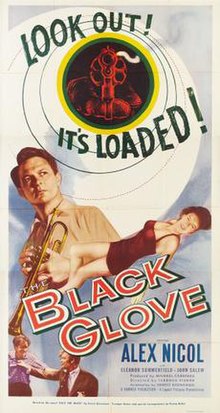Face the Music (U.S. title: The Black Glove) is a 1954 British second feature ('B')[1] crime drama film directed by Terence Fisher and starring Alex Nicol, Eleanor Summerfield and Paul Carpenter.[2][3] It was written by Ernest Borneman based on his 1954 novel of the same title. It was released in the United States by Lippert Pictures.
| Face the Music | |
|---|---|
 American Theatrical release poster | |
| Directed by | Terence Fisher |
| Screenplay by | Ernest Borneman |
| Based on | Face the Music by Ernest Borneman |
| Produced by | Michael Carreras |
| Starring | Alex Nicol Eleanor Summerfield Paul Carpenter |
| Cinematography | Walter J. Harvey |
| Edited by | Maurice Rootes |
| Music by | Ivor Slaney Kenny Baker |
Production company | |
| Distributed by | Exclusive Films Lippert Pictures (US) |
Release dates |
|
Running time | 84 minutes |
| Country | United Kingdom |
| Language | English |
Plot
editMaxine Halbard, a London nightclub blues singer, is murdered. American trumpeter James Bradley, who was with her on the final night she was alive, is implicated in the crime, but innocent, and sets out to clear his name. In the course of his enquiries he meets Maurice Green, who runs a recording studio. It turns out that Green is mentally unstable, and Bradley exposes him as the real murderer.[4]
Cast
edit- Alex Nicol as James Bradley
- Eleanor Summerfield as Barbara Quigley
- John Salew as Maxie Maguilies
- Paul Carpenter as Johnny Sutherland
- Geoffrey Keen as Maurie Green
- Ann Hanslip as Maxine Halbard
- Fred Johnson as Detective Sergeant MacKenzie
- Martin Boddey as Inspector Mulrooney
- Arthur Lane as Jeff Colt
- Paula Byrne as Gloria Lewis Colt
- Leo Phillips as dresser
- Freddie Tripp as stage manager
- Ben Williams as gatekeeper
- Frank Birch as trumpet aalesman
- Jeremy Hawk as recording technician
- Melvyn Hayes as hotel bellhop
Production
editIt was produced by Hammer Films and shot at Bray Studios outside London with sets designed by the art director J. Elder Wills.[2]
Critical reception
editThe Monthly Film Bulletin wrote: "Though this highly involved and improbable affair is given a contain gloss by slick camera work and competent direction, nothing could bring an essentially unconvincing story to life, The denizens of Archer Street and Soho are well portrayed, but Alex Nicol seems uneasy in the leading role. Some shots of the show at the Palladium are interesting, and the music, particularly Kenny Baker's trumpet playing, is very effective."[5]
Kine Weekly wrote: "Who-dunnit generously interspersed with hot rhythm. Its tale of an American musician who solves a tricky murder mystery during his stay in London is a bit involved, but the types are convineing and the climax exciting. Moreover, the jam 'sessions' are long enough to please bobbysox fans, without irritating grown-ups. Showmanlike, comprehensive and abounding with exploitation angles, it's a sound proposition for the crowd."[6]
Allmovie wrote: "Not one of Fisher's more rousing films."[4]
In The Radio Times Guide to Films David Parkinson gave the film 2/5 stars, writing: "This adequate mystery offers a rare nice guy outing to soulless screen villain Alex Nicol, slumming in Britain after his Hollywood career went into a decline. Looking nothing like a trumpeter, he goes underground to prove his innocence when he is accused of murdering a singer. In one of his last assignments before becoming Hammer's horror maestro, director Terence Fisher never manages to intrigue."[7]
In British Sound Films: The Studio Years 1928–1959 David Quinlan rated the film as "mediocre", writing: "Slow-paced whodunnit with phoney showbiz atmosphere. Star seems ill-at-ease."[8]
References
edit- ^ Chibnall, Steve; McFarlane, Brian (2009). The British 'B' Film. London: BFI/Bloomsbury. p. 49. ISBN 978-1-8445-7319-6.
- ^ a b "Face the Music". British Film Institute Collections Search. Retrieved 5 April 2024.
- ^ "Face the Music (1953)". Archived from the original on 17 February 2017.
- ^ a b "The Black Glove (1954) – Terence Fisher – Synopsis, Characteristics, Moods, Themes and Related – AllMovie".
- ^ "Face the Music". The Monthly Film Bulletin. 21 (240): 39. 1 January 1954 – via ProQuest.
- ^ "Face the Music". Kine Weekly. 443 (2432): 22. 4 February 1954. ProQuest 2732605259.
- ^ Radio Times Guide to Films (18th ed.). London: Immediate Media Company. 2017. p. 303. ISBN 9780992936440.
- ^ Quinlan, David (1984). British Sound Films: The Studio Years 1928–1959. London: B.T. Batsford Ltd. p. 307. ISBN 0-7134-1874-5.